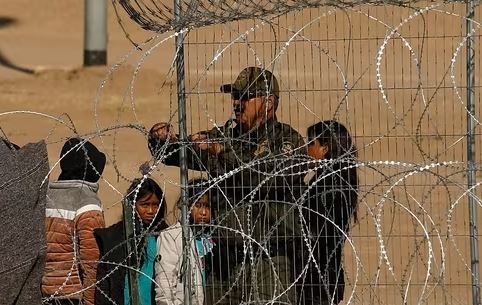
In a recent 5-4 decision, the U.S. Supreme Court has granted temporary permission for U.S. Border Patrol agents to modify or remove razor-wire fencing installed by Texas officials along part of the state’s border with Mexico. This move aims to deter illegal border crossings and comes as part of the broader Operation Lone Star initiative launched by Republican Texas Governor Greg Abbott in 2021.
Legal Battles and Supreme Court Intervention
The decision follows a lower court’s ruling that temporarily blocked federal agents from altering the fencing while litigation unfolds. Chief Justice John Roberts and Justice Amy Coney Barrett, both conservative members of the court, joined forces with three liberal justices in the majority. Conversely, conservative Justices Clarence Thomas, Samuel Alito, Neil Gorsuch, and Brett Kavanaugh dissented.
The 5th U.S. Circuit Court of Appeals, set to hear arguments on Feb. 7, issued the contested interim ruling. The central question revolves around whether Border Patrol agents violated Texas law by cutting the razor-wire barrier installed on private property along the Rio Grande river.
Want to know if you’re earning what you deserve? Find out with LawCrossing’s salary surveys.
Operation Lone Star and Texas’ Legal Challenge
Operation Lone Star, initiated to curb illegal border crossings, has faced legal challenges from Texas. In October 2023, the state sued the Biden administration, alleging intensified practices by U.S. Customs and Border Protection agents in damaging strategically placed fencing on private land. The fencing at the heart of the dispute was installed with the permission of landowners.
U.S. District Judge Alia Moses ruled in November that Texas’ legal claims couldn’t overcome the federal government’s sovereign immunity, protecting it from civil lawsuits and criminal prosecution. However, the 5th Circuit, in a December 19 ruling, temporarily blocked federal agents from interfering with the razor-wire fencing, except in cases of medical emergencies.
Biden Administration’s Stance and White House Response
The Biden administration, critical of the 5th Circuit’s ruling, argued in a Jan. 2 court filing that there was no evidence indicating the razor-wire had effectively deterred migrants. In a subsequent Jan. 12 filing, the administration claimed that new barriers set up by Texas impeded Border Patrol agents’ ability to monitor and respond to emergencies.
On Monday, the White House expressed approval of the Supreme Court’s decision, emphasizing the need for comprehensive resources and policy changes to address the immigration system’s challenges. A spokesperson stated that President Biden is actively working towards a bipartisan agreement with Congress for additional resources and meaningful policy reforms.
Political Context and Election Dynamics
Against the backdrop of sharp Republican criticism of President Biden’s immigration policies, the issue of illegal entries across the U.S.-Mexico border is expected to intensify in the lead-up to the November 5 election. The Democratic president, seeking another four years in office, faces heightened scrutiny over his administration’s handling of immigration matters.
Don’t be a silent ninja! Let us know your thoughts in the comment section below.
